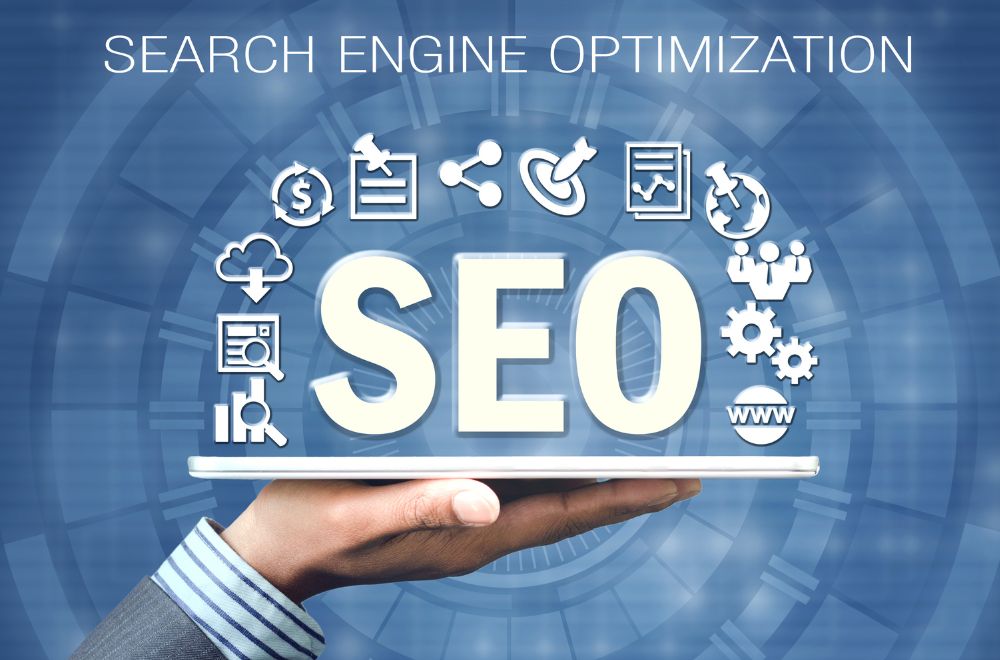What is SEO? Search Engine Optimisation (SEO) is a pivotal digital marketing tool that can significantly boost your startup’s online visibility. SEO makes it easier for potential clients to find your business by ensuring your website ranks highly on search engines like Google. For burgeoning ventures, mastering SEO isn’t just about increasing traffic; it’s about attracting quality visitors who are more likely to convert into customers.
We explore the essential components of SEO, showing how it can enhance brand credibility, offer cost-effective marketing solutions, and provide long-term benefits over paid advertising. With insights into on-page, off-page, technical SEO, and local SEO strategies, we’ll equip you with the knowledge to position your startup for success in the competitive digital landscape.
What is SEO?
SEO is a digital marketing strategy that enhances your online presence by improving visibility on search engines like Google. When potential clients search for keywords related to your business, effective SEO practices can help your website appear prominently in search results, increasing the likelihood of attracting visitors.
Basics Of SEO
At its core, SEO is about making your website more appealing to search engines. This involves various techniques and strategies to improve your site’s ranking in Search Engine Results Pages (SERPs). The higher your site ranks, the more visible it becomes to potential clients, which can significantly impact your business’s growth and success. SEO isn’t just about driving traffic; it’s about attracting the right traffic to convert customers.
Key Components of SEO
When you understand the four main components of SEO, you can improve your online presence effectively. These components are Technical SEO, Content, On-site SEO, and Off-site SEO, each playing a vital role in the overall strategy.
Technical SEO focuses on optimising your website’s backend to ensure search engines can easily crawl and index your content. This includes improving site speed, ensuring mobile compatibility, and maintaining a clean site structure. A well-optimised technical foundation is essential for SEO success.
Content is another critical component, often referred to as the king of SEO. High-quality, relevant content that addresses your audience’s needs and queries is vital. Search engines evaluate the relevance of your content based on the keywords it contains, so it’s important to create material that is both informative and keyword-rich.
On-site SEO involves optimising individual pages on your website to improve their search engine rankings. This includes using appropriate keywords and meta tags and ensuring a user-friendly design. Knowing your audience and how they interact with your site is key to effective on-site SEO.
Off-site SEO, on the other hand, involves activities outside your website that can influence your rankings. This includes building backlinks from reputable sites, increasing social media engagement, and guest blogging. These strategies help enhance your site’s authority and visibility.
How SEO Differs from SEM
While SEO focuses on organic search results, Search Engine Marketing (SEM) involves paid strategies to increase visibility. SEM includes pay-per-click (PPC) advertising, where businesses pay for their ads to appear in search results.
Unlike SEO, which is a long-term strategy, SEM can provide immediate results but requires ongoing investment. SEO, however, offers sustainable benefits as it continues to drive traffic even after initial efforts have been made.
SEO and Its Core Functions
SEO serves as the foundation of a holistic marketing strategy, where every aspect of your online presence is interconnected. It’s not just about improving search rankings; it’s about enhancing user experience, building brand credibility, and driving real business results. By optimising your website for search engines, you ensure that your content is easily accessible and relevant to your audience, ultimately leading to increased engagement and conversions.
Importance of SEO for Startups
Increasing Online Visibility
For startups, creating a robust online presence is essential. SEO is instrumental in boosting visibility on search engines. Enhancing your website to achieve higher rankings in SERPs increases the chances of potential customers finding your business.
A significant portion of web traffic—over 53%—comes from organic search, making SEO a vital tool for attracting visitors. Additionally, since 75% of users do not scroll past the first page of search results, securing a top position is crucial.
By prioritising SEO, you can effectively engage a wider audience and improve your conversion rates.
Building Brand Credibility
Beyond visibility, SEO contributes to establishing brand identity and credibility. Users generally place more trust in organic search results compared to paid ads. When your startup ranks well in organic searches, it conveys to users that your brand is reliable and trustworthy. This perception is particularly important for new businesses aiming to carve out a niche in a competitive landscape.
Furthermore, consistently delivering valuable and relevant content positions your startup as an authority in your field. As user engagement with your content increases, so does your brand’s reputation and trustworthiness.
Cost-Effectiveness Compared to Paid Ads
SEO presents a more economical option for startups with limited financial resources than paid advertising. While paid ads can yield quick results, they necessitate ongoing investment to maintain visibility. In contrast, SEO’s advantages are enduring. Once your website is optimised and achieves a good ranking, it continues to draw organic traffic without incurring additional costs.
Studies show that SEO can significantly lower customer acquisition costs compared to digital advertising.
Moreover, 70% of marketers believe that SEO yields superior results compared to Pay-Per-Click (PPC) campaigns.
By focusing on SEO, you can foster sustainable growth without the financial burden associated with paid ads.
Long-term Marketing Strategy
SEO represents a strategic investment that provides long-term advantages for startups. Unlike paid advertising, which stops generating traffic once funding is depleted, SEO maintains its effectiveness over time. A well-implemented SEO strategy enhances your website’s visibility and ensures a consistent influx of targeted traffic.
This audience is more likely to convert into paying customers as they have actively sought out your offerings. Additionally, SEO fosters a user-friendly website that improves the overall customer experience, encouraging visitors to interact with your content and take action. Concentrating on SEO can lay a strong foundation for ongoing growth and success in the digital arena.
Key Types of SEO
On-page SEO Basics
On-page SEO is essential for enhancing your website’s visibility in search engines. It focuses on optimising individual web pages to improve rankings and attract relevant traffic. This process involves refining the quality and relevance of your content to meet audience needs while remaining search engine-friendly. Important aspects of on-page SEO include optimising title tags and meta descriptions, which significantly encourage users to click on your link in search results.
A well-structured URL and heading hierarchy can also enhance user experience and help search engines better understand your content. Effective internal and external linking strategies are essential, as they assist in distributing page authority and directing users to other valuable resources.
Off-page SEO Strategies
Off-page SEO includes actions taken outside your website to enhance its authority and visibility. These strategies are vital for establishing your site’s reputation and trustworthiness with search engines. A key component of off-page SEO is acquiring high-quality backlinks from reputable sources, which signals to search engines that your content is credible and valuable.
Engaging in social media marketing and influencer outreach can further boost your site’s visibility and drive traffic. By prioritising off-page SEO, you can enhance your site’s authority— increasing the likelihood of higher rankings in search results and attracting a wider audience.
Technical SEO Essentials
Technical SEO is a fundamental aspect that ensures search engines can effectively find, crawl, and index your website’s pages. Even the most valuable content may not appear in search results without proper technical optimisation. Key elements of technical SEO include improving site speed and ensuring mobile compatibility, both of which are confirmed ranking factors. A well-organised site structure and a detailed sitemap facilitate quick navigation for search engine crawlers.
Furthermore, implementing structured data, or schema markup, can enrich your search results with additional information, providing users with more context at a glance. Regularly monitoring and fixing broken pages is also essential, as they can detrimentally affect user experience and search engine rankings.
Local SEO for Startups
For startups with a physical location, local SEO is a key requirement. It assists potential customers in discovering your business online when searching for nearby services or products. Local SEO involves creating a Google Business Profile and ensuring your business is listed on Google Maps, which enhances your visibility in local search results.
Crafting content that resonates with your community and gathering positive local reviews can further strengthen your local search presence. Given that a significant portion of Google searches are for local businesses or services, optimising for local SEO can greatly influence your startup’s ability to attract local customers and increase foot traffic to your establishment.
How SEO Works
Understanding the mechanics of SEO is necessary for enhancing your online visibility. This process encompasses various strategies and techniques to improve a website’s prominence on search engines like Google. Several key elements work in tandem to ensure your content reaches the appropriate audience.
Search Engine Algorithms
Central to SEO are search engine algorithms, which consist of intricate rules and calculations that search engines use to evaluate the relevance and quality of web pages in response to user queries.
For example, Google utilises over 200 ranking factors to determine the order of displayed results.
These algorithms emphasise user experience, ensuring that individuals quickly find the most pertinent and useful information. By grasping how these algorithms function, you can craft an effective SEO strategy that aligns your content with search engines’ criteria for ranking.
Keyword Research and Optimisation
A fundamental aspect of SEO is keyword research, which involves identifying and analysing the search terms potential customers use. This process helps you understand your audience’s needs and allows you to tailor your content accordingly.
Concentrating on relevant topics and keywords can enhance your chances of achieving higher rankings in search results, thereby driving more traffic to your site. It’s essential to consider the keywords and the intent behind them, ensuring your content addresses the specific problems or questions your audience seeks to resolve.
Content Creation and Optimisation
Creating and optimising content is vital for making your website both engaging and discoverable by search engines. This involves enhancing your digital content to boost its quality and relevance. Important elements include crafting compelling titles and meta descriptions, naturally incorporating keywords, and acquiring authoritative backlinks.
However, it is necessary to prioritise the needs of human readers first. By focusing on delivering valuable and engaging content, you inherently improve its search engine friendliness, ensuring it effectively reaches your target audience.
Monitoring and Analysing SEO Performance
Consistently monitoring and analysing your SEO performance is essential for understanding the effectiveness of your strategies and identifying areas for improvement. Analytics tools can provide insights into various metrics, such as page views, social shares, and conversion rates. These metrics enable you to evaluate the success of your SEO efforts and make informed decisions about future strategies.
Additionally, by regularly assessing your website and its individual pages, you can ensure they remain optimised for search engines and adapt to any shifts in algorithms or user behaviour. This continuous evaluation and adjustment process is important for maintaining and enhancing your website’s visibility in search results.
Getting Started with SEO for Your Startup
Conducting an SEO Audit
Embarking on your SEO journey begins with a thorough audit of your website. This evaluation assesses how well your site is optimised for search engines, identifies issues that may affect your ranking, and reveals opportunities for improvement. An effective audit relies on concrete data regarding your site’s technical performance, traffic patterns, and backlink profile.
Focus areas should include indexing, crawlability, site structure, keyword analysis, on-page optimisation, and backlink evaluation. Addressing these components can prepare your website for enhanced search engine performance.
Setting Up SEO-Friendly Website Architecture
A well-organised website is essential for both user experience and SEO. Effective site architecture promotes easy navigation for users and search engines, which can lead to improved rankings. For instance, Google utilises internal links to discover and index pages. Therefore, structuring your site so that content is accessible within three clicks or fewer is optimal.
Grouping related content thematically helps search engines understand the relationships between pages and enhances your site’s topical authority, potentially increasing your rankings and attracting more organic traffic. Internal links are integral in this process, as they assist search engines in crawling your site, guide users in navigation, and direct PageRank to your most important pages.
Utilising SEO Tools and Resources
SEO tools are vital for refining your strategy and obtaining valuable insights. They streamline the process of gathering essential data, allowing you to optimise your SEO efforts more effectively. Regularly monitoring your performance through tools like Google Search Console is useful for any website owner. Google Analytics, for instance, offers important insights into traffic sources and the share of organic traffic, informing your SEO strategies.
For e-commerce businesses, SEO objectives may include enhancing rankings for purchase intent keywords and minimising bounce rates on product pages. For SaaS startups, providing resources that cater to the needs of key customer segments can be particularly beneficial.
Continual Learning and Adaptation
SEO is an ongoing process that requires continuous learning and adaptation. As search engine algorithms change and user behaviour evolves, staying informed and flexible is essential. Regularly reviewing your website’s user experience, structure, navigation, and mobile compatibility is important, as these elements significantly influence SEO.
Ensuring that visitors can easily navigate your site, access content on mobile devices, and find what they need without difficulty is key to maintaining and improving your rankings. Keeping URLs clear and consistent is also extremely important— as Google uses them to interpret your site’s hierarchy and structure. By consistently refining your approach, your startup can fully leverage the potential of SEO for sustained success.
Embracing SEO for Future Success
SEO is undeniably a cornerstone for any startup aiming to establish a strong digital presence. By enhancing online visibility, building brand credibility, and offering a cost-effective marketing solution, SEO empowers new businesses to compete in a crowded marketplace.
The ongoing nature of SEO requires dedication and adaptability, yet the long-term benefits are well worth the effort. By optimising your website’s architecture, content, and technical elements, you can ensure your startup remains competitive and continues attracting a targeted audience.
As you embark on your SEO journey, remember that success is rooted in understanding your audience and providing valuable content. Invest time in learning and adapting to the evolving landscape. Your startup will be well-positioned for sustainable growth and success. Embrace the power of SEO and unlock the potential for your business’s digital future.




